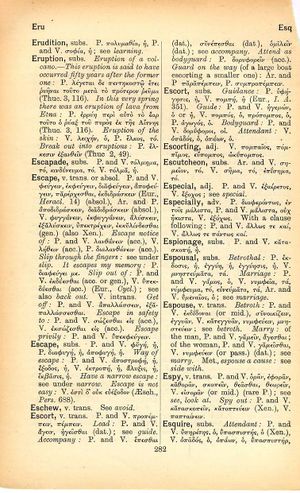espouse: Difference between revisions
From LSJ
ἐὰν δ' ἔχωμεν χρήμαθ', ἕξομεν φίλους → if we have money, then we will have friends | if we have money, we shall have friends
(CSV4) |
m (Woodhouse1 replacement) |
||
| Line 1: | Line 1: | ||
{{Woodhouse1 | {{Woodhouse1 | ||
|Text=[[File:woodhouse_282.jpg|thumb|link={{filepath:woodhouse_282.jpg}}]] | |Text=[[File:woodhouse_282.jpg|thumb|link={{filepath:woodhouse_282.jpg}}]] | ||
===verb transitive=== | |||
Met., | [[betroth]]: [[prose|P.]] and [[verse|V.]] [[ἐκδίδοναι]] (or mid.), [[συνοικίζειν]], [[ἐγγυᾶν]]. [[verse|V.]] [[κατεγγυᾶν]], [[νυμφεύειν]], [[μνηστεύειν]]; see [[betroth]]. | ||
[[marry]]: of the [[man]], [[prose|P.]] and [[verse|V.]] [[γαμεῖν]], [[ἄγεσθαι]]; of the [[woman]], [[prose|P.]] and [[verse|V.]] [[γαμεῖσθαι]], [[verse|V.]] [[νυμφεύειν]] (or pass.) (dat.); see [[marry]]. | |||
Met., [[espouse a cause]]: see [[side with]]. | |||
}} | }} | ||
Revision as of 08:53, 20 May 2020
English > Greek (Woodhouse)
verb transitive
betroth: P. and V. ἐκδίδοναι (or mid.), συνοικίζειν, ἐγγυᾶν. V. κατεγγυᾶν, νυμφεύειν, μνηστεύειν; see betroth.
marry: of the man, P. and V. γαμεῖν, ἄγεσθαι; of the woman, P. and V. γαμεῖσθαι, V. νυμφεύειν (or pass.) (dat.); see marry.
Met., espouse a cause: see side with.

